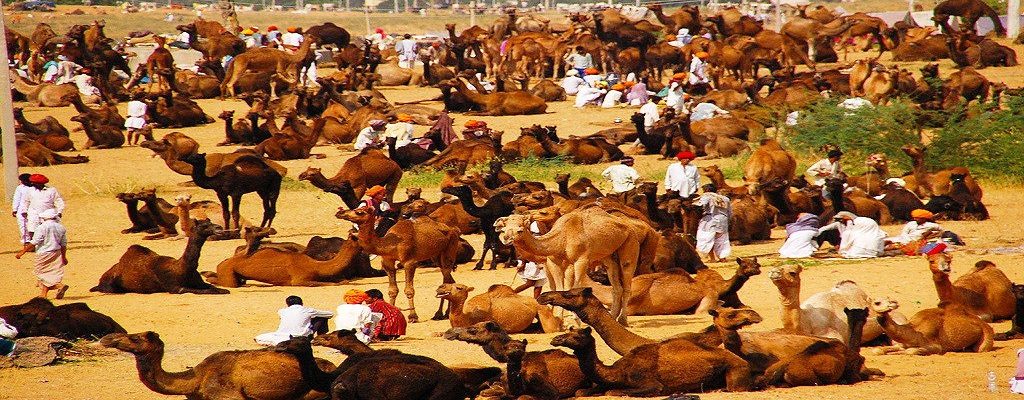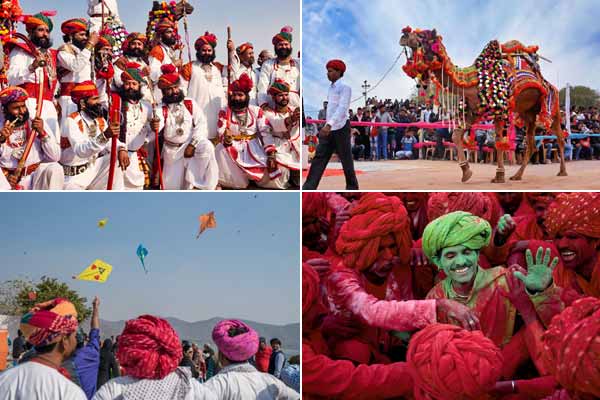10 Colorful Festivals of Rajasthan, the land of kings, is renowned for its vibrant and colorful festivals, which reflect its rich cultural heritage. One of the most famous is the Pushkar Camel Fair, where thousands of camels, horses, and cattle are traded, accompanied by folk music, dance, and competitions. The Jaipur Literature Festival is another significant event, attracting writers and thinkers from around the world. Diwali, the festival of lights, is celebrated with grandeur, illuminating the cities with lamps and fireworks.
The Desert Festival in Jaisalmer showcases Rajasthani culture through folk performances, camel races, and turban-tying competitions. Teej, celebrated primarily by women, marks the arrival of monsoon and is known for its colorful processions and traditional songs. Gangaur is another women-centric festival, where beautifully dressed women carry idols of Goddess Gauri in a grand procession.
Each festival in Rajasthan is a vivid display of the state’s traditions, making it a captivating destination for anyone looking to experience the true essence of Indian culture.

Pushkar Camel Fair
When: October/November
Where: Pushkar
Highlights: One of the largest camel fairs in the world, featuring camel races, cultural performances, and a vibrant marketplace.
The Pushkar Camel Fair, held annually in the holy town of Pushkar, Rajasthan, is one of the largest and most vibrant livestock fairs in the world. This iconic event, typically taking place in November, draws thousands of camels, horses, and cattle, along with traders, pilgrims, and tourists from across the globe.
The fair is a spectacle of Rajasthani culture, featuring traditional folk music and dance performances, camel races, and competitions like the “longest mustache” and “bridal attire” contests. The sight of colorfully decorated camels being paraded and traded is a highlight, offering a unique glimpse into the region’s pastoral lifestyle.
Apart from the livestock trading, the fair coincides with the religious Kartik Purnima festival, when pilgrims take a sacred dip in Pushkar Lake. The spiritual and cultural dimensions of the Pushkar Camel Fair make it an extraordinary experience, blending the rustic charm of rural Rajasthan with its deep spiritual roots.
Diwali
When: October/November
Where: Statewide
Highlights: Known as the “Festival of Lights,” Diwali is celebrated with illuminated homes, fireworks, and feasts, symbolizing the victory of light over darkness.
Diwali, also known as the Festival of Lights, is one of India’s most celebrated festivals, and it holds special significance in Rajasthan. Marking the victory of light over darkness and good over evil, Diwali commemorates the return of Lord Rama to Ayodhya after defeating the demon king Ravana. The festival usually lasts for five days, with the main day known as Lakshmi Puja, dedicated to the worship of Goddess Lakshmi, the goddess of wealth.
Homes and streets across Rajasthan are adorned with vibrant rangoli designs, oil lamps (diyas), and electric lights, creating a mesmerizing glow. People wear new clothes, exchange sweets, and burst firecrackers to celebrate the joyous occasion. The markets buzz with activity as families prepare for the festivities, buying gifts and decorations.
In cities like Jaipur, the Diwali lights are particularly spectacular, with entire markets and monuments illuminated, attracting tourists from around the world. Diwali in Rajasthan is a beautiful blend of tradition, festivity, and community spirit.
Desert Festival
When: February
Where: Jaisalmer
Highlights: A three-day extravaganza in the Thar Desert, featuring folk dances, camel races, turban-tying competitions, and a grand parade.
The Desert Festival in Jaisalmer is a vibrant celebration of Rajasthani culture, held annually in the heart of the Thar Desert. This three-day extravaganza typically takes place in February, drawing visitors from around the world to witness the rich traditions of the region.
The festival is a lively showcase of folk music, dance, and local customs. Events like camel races, turban-tying competitions, and Mr. Desert contests add a unique charm to the festivities. The Kalbeliya dance, performed by the nomadic Kalbeliya tribe, and the Ghoomar dance, are among the cultural highlights that captivate the audience.
Traditional music, played on instruments like the sarangi and dholak, fills the air, creating a mesmerizing atmosphere. The festival concludes with a grand procession to the Sam Sand Dunes, where cultural performances take place against the backdrop of a stunning sunset.
The Desert Festival is a must-see for anyone looking to experience the colorful spirit and rich heritage of Rajasthan.
Holi
When: March
Where: Statewide
Highlights: The “Festival of Colors” where people celebrate by throwing colored powders, dancing, and enjoying festive foods.
Holi, the festival of colors, is one of the most joyous and widely celebrated festivals in India, and Rajasthan brings its own unique charm to this vibrant celebration. Marking the arrival of spring, Holi is a time when people come together to smear each other with colorful powders, dance to lively music, and enjoy festive foods like gujiya and thandai.
In Rajasthan, the festivities are particularly grand in cities like Jaipur, Udaipur, and Pushkar. Jaipur’s Holi is known for its royal touch, with celebrations at the City Palace, where traditional rituals are performed, followed by a lively playing of colors. In Udaipur, the royal family partakes in the festival, leading a grand procession and lighting a ceremonial bonfire known as Holika Dahan.
Pushkar, famous for its bohemian spirit, sees a massive influx of tourists who join the locals in a spirited celebration. Holi in Rajasthan is a mesmerizing experience, full of color, music, and joyful energy.
Teej
When: July/August
Where: Jaipur, and other parts of Rajasthan
Highlights: Celebrated by women with fasting, prayers, and vibrant processions. The swings decorated with flowers are a key feature.
Teej is a vibrant and joyous festival celebrated predominantly in Rajasthan, marking the arrival of the monsoon and honoring the goddess Parvati. It usually takes place in August and is particularly cherished by women. The festival is known for its colorful and lively processions, where women, dressed in bright, traditional attire, participate in various cultural activities.
One of the central rituals of Teej is the trading of traditional sweets and gifts, and women adorn themselves with intricate jewelry and henna designs. The celebrations include singing traditional folk songs, dancing, and performing rituals to seek blessings for marital bliss and family happiness. Women often observe fasts during the festival, praying for the well-being of their husbands or prospective partners.
The festival’s highlight is the grand procession, featuring beautifully decorated elephants, camels, and horses, which creates a festive and enchanting atmosphere across the region. Teej truly captures the essence of Rajasthan’s rich cultural heritage and the spirit of its people, 10 Colorful Festivals of Rajasthan.
Gangaur
When: March/April
Where: Jaipur, Udaipur, and other cities
Highlights: A festival dedicated to Goddess Parvati, involving processions, singing, dancing, and the immersion of idols.
Gangaur is a vibrant and joyous festival celebrated predominantly in Rajasthan, honoring the goddess Gauri, a symbol of marital bliss and fertility. Held in March or April, it marks the end of the Hindu festival of Holi. The festival is especially significant for married women, who celebrate for their husband’s well-being and prosperity, while unmarried women seek a good husband, 10 Colorful Festivals of Rajasthan.
The celebrations typically last for 16 days, beginning with Chaitra Shukla Tritiya and culminating in Gangaur, the main day of festivities. Women dress in traditional Rajasthani attire, adorned with colorful bangles, intricate jewelry, and beautifully embroidered garments. They participate in processions carrying decorated idols of Goddess Gauri, singing folk songs, and performing traditional dances.
In cities like Jaipur, the festival features elaborate processions with beautifully decorated floats and vibrant parades, showcasing the rich cultural heritage of Rajasthan. Gangaur is not just a religious event but a lively celebration of community, tradition, and the joyous spirit of the region.
Makar Sankranti
When: January
Where: Jaipur
Highlights: Known for the kite-flying festival, where the skies are filled with colorful kites. The day also marks the harvest season.
Makar Sankranti, celebrated in mid-January, is one of the most significant festivals in Rajasthan, marking the transition of the Sun into the zodiac sign of Capricorn. This festival heralds the end of the winter solstice and the beginning of longer days, symbolizing the arrival of spring.
In Rajasthan, Makar Sankranti is celebrated with great enthusiasm and joy. The skies are filled with colorful kites as people engage in competitive kite flying, a tradition that transforms into a vibrant spectacle of creativity and camaraderie. Homes are decorated with rangoli (colorful patterns made from powders) and traditional sweets like tilgul (sesame and jaggery treats) are distributed, symbolizing warmth and prosperity.
Festive fairs and cultural performances often accompany the celebrations, showcasing traditional music, dance, and local crafts. Makar Sankranti in Rajasthan is a joyous occasion that brings people together to celebrate the changing seasons and the bounties of nature 10 Colorful Festivals of Rajasthan.
Nagaur Fair
When: January/February
Where: Nagaur
Highlights: A large cattle fair where farmers trade animals. The event also includes traditional games, music, and dance.
The Nagaur Fair, held annually in Nagaur, Rajasthan, is one of the state’s largest cattle fairs and a vibrant cultural celebration. This week-long event, usually taking place in January or February, draws thousands of livestock traders, farmers, and visitors. The fair is renowned for its impressive display of camels, horses, and cattle, which are traded and showcased in various competitions.
Beyond the trading of livestock, the Nagaur Fair features a lively mix of traditional Rajasthani activities. Visitors can enjoy folk music and dance performances, including the energetic Ghoomar dance and soulful Kalbeliya dance. The fair also hosts cultural events such as tug-of-war, camel races, and turban-tying contests 10 Colorful Festivals of Rajasthan.
The event is an excellent opportunity to experience Rajasthani culture, with stalls offering local crafts, textiles, and food. The vibrant colors, lively atmosphere, and traditional performances make the Nagaur Fair a unique and unforgettable experience for anyone visiting Rajasthan.
Brij Holi
When: A few days before Holi
Where: Bharatpur
Highlights: Celebrated with songs and dances in honor of Lord Krishna, this festival is known for its unique style of playing Holi.
Brij Holi in Bharatpur is a vibrant and unique celebration of the festival of colors, held in the region of Braj, which includes Bharatpur. This festival is renowned for its traditional and exuberant celebrations, deeply rooted in the region’s cultural and religious heritage. Brij Holi is celebrated with immense enthusiasm, featuring traditional folk songs, dance performances, and the playful throwing of colors, which brings the streets to life in a riot of hues 10 Colorful Festivals of Rajasthan.
One of the highlights of Brij Holi is the Lathmar Holi, where men and women playfully engage in mock battles with sticks, a tradition that stems from local legends associated with Lord Krishna and his consort Radha. The festival also includes special events like Phoolon Ki Holi (Holi with flowers), where flowers are used instead of colors. Brij Holi in Bharatpur offers a chance to experience the festival in its most authentic form, reflecting the region’s deep connection to the traditions of Lord Krishna’s childhood.
Kite Festival – 10 Colorful Festivals of Rajasthan
When: January 14 (Makar Sankranti)
Where: Jaipur
Highlights: A day when the sky is filled with colorful kites, with various competitions and celebrations throughout the city.
The Kite Festival, or Makar Sankranti, is a vibrant celebration in Rajasthan that marks the transition of the sun into the zodiac sign of Capricorn. Held in mid-January, this festival signifies the end of winter and the beginning of longer days. Cities like Jaipur, Udaipur, and Jodhpur come alive with colorful kites soaring across the sky, creating a mesmerizing spectacle.
Families and friends gather on rooftops and open spaces, engaging in kite-flying contests and enjoying traditional sweets like tilgul (sesame and jaggery treats). The festival’s atmosphere is filled with excitement as participants try to outmaneuver each other’s kites. In some regions, there are special events and fairs featuring music, dance, and cultural performances, adding to the festive spirit.
The Kite Festival not only offers a thrilling experience but also symbolizes the joy of togetherness and the triumph of light over darkness, embodying the lively and festive spirit of 10 Colorful Festivals of Rajasthan.
